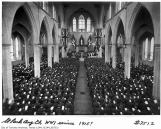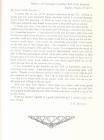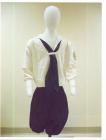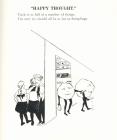14
'Havergalians' on the HomefrontThe war effort played a pivotal role in the Havergal curriculum - both formal and informal. From educational lectures, to knitting drives, to fundraising bazaars, the Havergal community was kept consistently busy with war work supporting the homefront. The school faculty clearly made an effort to keep the girls' duty to the war effort uppermost in their minds and daily schedules.
A survey of archival materials indicates that knitting and filling Christmas stockings was the most popular activity by far. In 1916, a student poetess wrote in the yearbook: "Sing a song of knitting/A bag full of yarn/Four and twenty school girls/Kept safely out of harm;/When the socks are finished/ They'll send them far away,/To the soldiers standing/In wet trenches all the day."
15
Havergal takes on YWCA work1915
Jarvis Street, Toronto, Ontario, Canada
 Credits:
Credits:Dr. Catherine Steele 1928 Archives, Havergal College
16
Soldiers at St Paul's Anglican Church1915
Bloor St., Toronto, Ontario, Canada
 Credits:
Credits:City of Toronto Archives Fonds 1244
17
Christmas Socks for Soldiers in Hospital: a thank you letter1915-1916
Jarvis Street, Toronto, Ontario, Canada
 Credits:
Credits:Dr. Catherine Steele 1928 Archvies, Havergal College
18
Snapshot: 'Tramp, Tramp, Tramp, the Boys are Marching'1916
Jarvis Street, Toronto, Ontario, Canada
 Credits:
Credits:Dr. Catherine Steele 1928 Archives, Havergal College
19
A vaudeville concert: The Shrapnel Dodgers1917
St. Clair Avenue, Toronto, Ontario, Canada
 Credits:
Credits:Dr. Catherine Steele 1928 Archives, Havergal College
20
"The chief exports of Canada are socks for soldiers"1918
Jarvis Street, Toronto, Ontario, Canada
 Credits:
Credits:Dr. Catherine Steele 1928 Archives, Havergal College
21
Knitting & the Havergal College Junior School war effort1918
St. Clair Avenue, Toronto, Ontario, Canada
 Credits:
Credits:Dr. Catherine Steele 1928 Archives, Havergal College
22
Middy UniformCirca 1902
Jarvis Street, Toronto, Ontario, Canada
 Credits:
Credits:Dr. Catherine Steele 1928 Archives, Havergal College
23
UniformCirca 1905
Jarvis Street, Toronto, Ontario, Canada
 Credits:
Credits:Dr. Catherine Steele 1928 Archives, Havergal College
24
Food ConservationBy 1918, the girls were being asked to practice economy in both small purchases (especially clothing and fancy goods), and food intake. They were told "that if every person in Canada saved one piece of bread each day it would feed 25,000 people in England. That if every individual saved one teaspoonful of sugar each day it would amount to fifty-five tons a day, 4,000,000 a year, the cost of which would buy 265 aeroplanes. It is, therefore, some comfort ...to think that every time you take a sugarless anything, you simultaneously launch an aeroplane."
The girls' answer to the food conservation appeal was the Candy Campaigns: "by March 14, 112 girls had signed (total abstinence) till June, and fifty girls for the duration of the war." (Ludemus yearbook, 1918)
25
The appeal - and danger - of 'tuck' shop1917
Jarvis Street, Toronto, Ontario, Canada
 Credits:
Credits:Dr. Catherine Steele 1928 Archives, Havergal College
26
Food Conservation: a new strategy on the homefront1918
Jarvis Street, Toronto, Ontario, Canada
 Credits:
Credits:Dr. Catherine Steele 1928 Archives, Havergal College
27
A Woman's Duty: Havergal and Relief EffortsWomen's war work could be (as it was at Havergal) tied up with themes of motherly care, filial duty to the imperial motherland, and inspirational femininity.
Principal Ellen Knox would echo these sentiments on numerous occasions during the war years: [Women's work - including tidiness, obedience and diligence at school] "may seem comparatively insignificant and monotonous, but if, as by the purity of our lives, we can lift the tone and temper of all around us, we shall be one of the silent forces guarding the safety of the land just as the ironclad battleships are silent forces guarding the safety of the sea." (Ludemus yearbook, 1918)